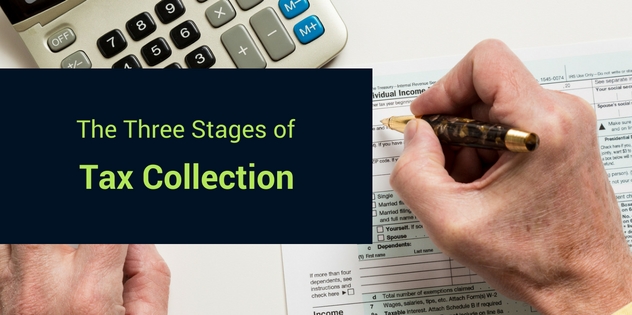What Kind of Licensed Practioner Should You Look for to Represent You Before the IRS?
The Three Stages of Tax Collection
The first step in helping resolve a tax problem is determining where your case is in the collection cycle. Some of our Massachusetts tax debt clients have many years of unfiled tax returns and have had no substitute tax return assessments made by the IRS. Others have had taxes assessed by the IRS but have ignored the IRS demands for payment, thus receiving a date with a federal judge in US District Court. Most fall somewhere in between. The following video explains in more detail what each phase of the three stages of the tax debt collection cycle means for people with tax problems. Below is a summary of each phase from the video.
Stage 1 Phase – The IRS Campus. Once you file your tax return, the IRS will send you a balance due notice from the IRS regional “campus” where the IRS returns are processed. Four notices get generated in this phase and there is no enforced collection activity (levies, seizures, liens) but the longer you wait the more threatening the notices become. Note: It’s a good time to contact the IRS during this phase to get holds placed on enforced collection action in order to buy some time and slow down the collection process from entering Stage 2.
Stage 2 Phase – Automated Collection System or ACS. These are call centers all over the country that work cases on the telephone or through the mail. Cases are worked on what’s called a “first in, first out” basis. This means that your case will be worked by different people all over the country at different points in this stage. As a result, it can be more difficult to resolve cases that have gone to ACS because you will deal with different people from different parts of the country every time you call to discuss your case and you don’t get to meet in person like you can when your case is in a local field office (Phase 3).
Stage 3 Phase – The IRS Field Office. If ACS is unable to resolve your tax issue, the case will get sent into a local field office near you. This is a very serious stage and should not to be taken lightly. IRS Revenue Officers, who are tasked with collecting taxes and securing unfiled tax returns, can also visit you at your home or business as well as issue a summons requesting you appear before them at their local field office on a specific date. Failure to show up for an IRS Summons or showing up without the requested information or tax returns at a local field office will eventually result in the Revenue Officer requesting the US Attorney’s office schedule an enforcement hearing in US District Court before a federal judge! The local field office allows you the ability to meet an IRS Revenue Officer face to face but don’t expect them to go easy on you. Revenue Officers are trained to collect the maximum amount from you and they often prey upon your fears to do so. So do NOT try to represent yourself! These seemingly nice Revenue Officers have a lot of power and can seize assets, file liens, levy your bank accounts or paycheck, show up at your job and speak to your employer, or show up at your business and talk to your employees. So be very aware.
It is very important in this phase to deal with things in a timely manner and have a licensed, experienced tax resolution specialist, like a CPA or EA, who works solely in tax resolution, on your side to represent you. This is not a place to represent yourself because there is too much at stake. If you have unfiled returns, the IRS will keep hounding you for them and if you don’t file your tax returns, they will eventually come up with their own bloated and inflated substitute tax return or SFR assessments. That’s a guarantee! It’s time to take action and resolve your back tax issues today. Our Massachusetts tax resolution firm can help you – we have been helping individuals and businesses in Massachusetts resolve their IRS tax problems for years. Call 877-259-8200 for a free consultation.

Follow Us!